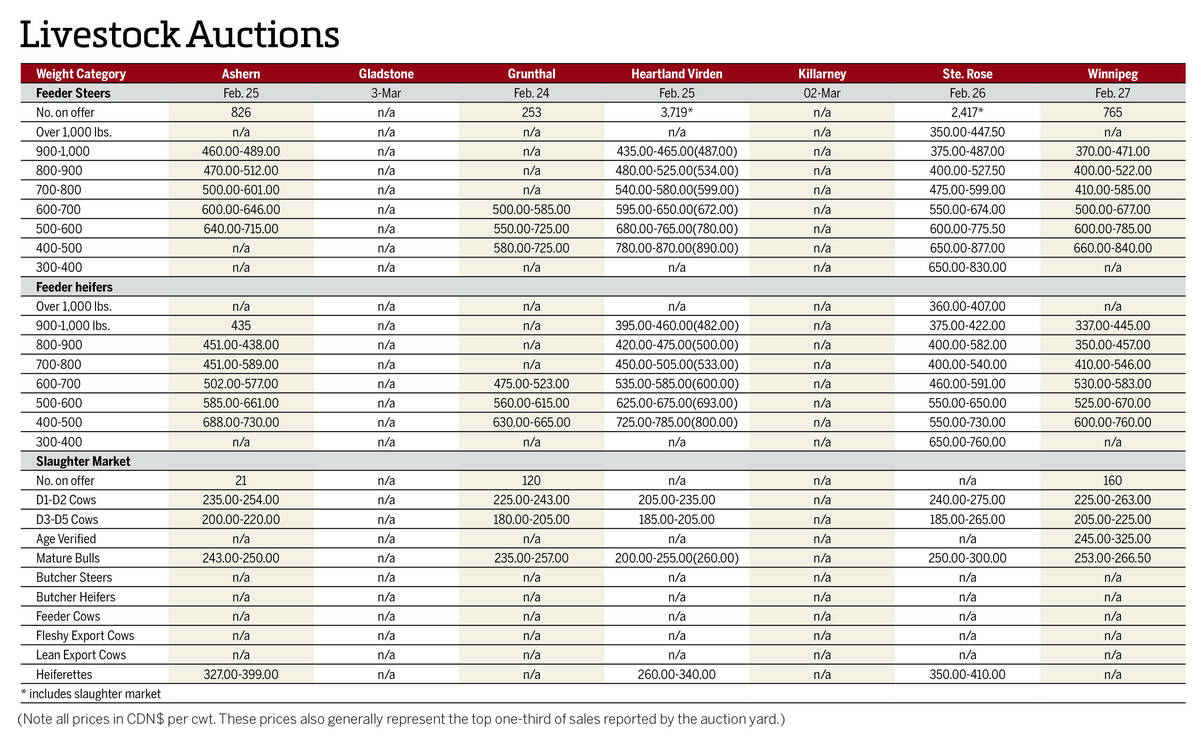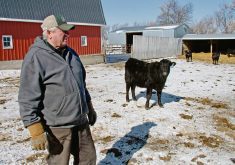When Zach Isaacs and Christopher Willows decided to start a wine business, they wanted to use Manitoba fruit.
The problem was, there weren’t any options for locally produced grapes for winemaking on the market. That changed in 2017.
Jeff Engles had been experimenting with grape vines at his farm near Winkler. Rigby Orchards was the first to produce commercial wines from Engles’ grapes in 2014. But the owner of the orchard, Grant Rigby, is also a grain farmer, and the timing of the grape harvest conflicted with his grain harvest. Rigby decided it wasn’t worth the trouble and abandoned the idea in 2017. That opened the door for Willows and Isaacs.
Read Also

Manitoba cattle prices, March 4
Chart of weekly Manitoba cattle prices.
“We started producing wine from the grapes from the vineyard in 2017, and we’ve made one (vintage) every year since,” he said. “We’ve been harvesting them since 2018, and I took over full management of the vineyard in 2020.”
WHY IT MATTERS
British Columbia and parts of Eastern Canada are Canada’s better known wine-making regions, but one Manitoba company is proving it can be done on the Prairies.
Isaacs and Willows are the founders of Shrugging Doctor Beverage Company, a wine, spirits, cider and mead maker that describes itself as the largest winery in Manitoba history. Isaacs has been making wine since he was old enough to legally buy alcohol.
“I was making wine at home, and everybody kept telling me, ‘oh, you could sell this’,” said Isaacs, who is now 27.
After perfecting his recipes, and after he and Willows joined forces, the pair opened their doors in a small rented facility in Winnipeg’s St. James neighbourhood.
Manitoba-grown grapes
Manitoba does have a native grape species, Vitis riparia, but it isn’t palatable and is unsuitable for wine.
Shrugging Doctor owes its vineyard to genetic improvements. Over the past 50 years, efforts have been made to breed hardy grape varieties capable of surviving harsh winters.
Wisconsin grape breeder Elmer Swenson was a pioneer of that field. As far back as 1945, he crossed French grapes with Vitis riparia to create a high-quality fruit capable of surviving Wisconsin winters.
In the late 1960s, Swenson went to work for the University of Minnesota, where he released his first two hybrids, Edelweiss and Swenson Red. He later released several other hybrids independently.
Shrugging Doctor Beverage Company grows several of Swenson’s hybrids in its vineyard, including Sabrevois, Prairie Star and Louise Swenson, a variety named after Swenson’s wife. It also grows a Quebec hybrid called Vandal Cliche, named after breeders Joseph Vandal and Mario Cliche.
“Obviously, Manitoba has a more limited growing season than the Niagara region or B.C., so the grapes we produce are on the acidic side,” said Isaacs. “But we use specific wine-making techniques for more acidic wines that make them a lot more palatable.”
There’s also been year-on-year improvement in the grapes grown in southern Manitoba.
“Grape vines, on average, at least in a more temperate climate, will produce fruit for between 70 and 90 years,” Isaacs said. “The general consensus is that the quality of the grapes goes up over time as the vines get older. Ours are about 15 years old now.”
The company’s small vineyard covers two acres and produces only a portion of the grapes needed to feed the blossoming business.
Last year, Shrugging Doctor produced 2,000 bottles of wine from the grapes grown at the vineyard, but produces roughly 30,000 bottles annually. It draws on other locally grown fruit to make up the difference, including Carmine Jewel cherries, a sour cherry bush variety that Isaacs planted around his vineyard.
“The whole property is circled by the cherry bushes for a wind break, so we make a cherry wine from that,” he said.
Other offerings include a strawberry-rhubarb wine, raspberry wine, blueberry wine and saskatoon berry wine, with fruit mainly sourced from local growers. Two types of mead are made from local honey.
The Shrugging Doctor Beverage Company moved to a new location in February. The new Winnipeg storefront, on the appropriately named Berry Street, includes a 100-seat tasting room and patio.
“We do wine flights and hot food, and we’re doing live music every Thursday,” said Isaacs.
They are also common vendors at the province’s farmer and artisan markets, “where people are looking specifically for locally produced products,” said Isaacs.
“We also have about 14 different products that are on liquor mart shelves.”
Updated July 24. Corrected to indicate Grant Rigby had previously used Manitoba grapes for wine-making.
















